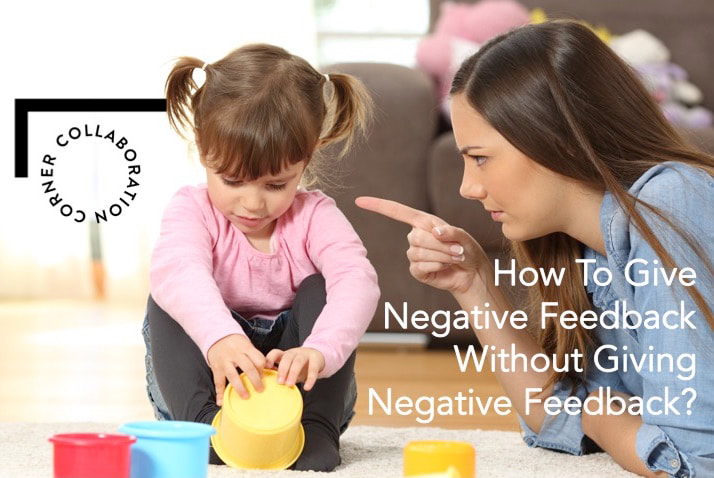|
There are costs to giving a child negative feedback. There are costs to self-esteem. Worse, there are costs to self-concept. Self-concept is what the child believes himself/herself to be.
In parent coaching, I often see parents who love their children so much that they fear the worst for them. They fear that these children will become their worst fears... - lazy - selfish - unkind - stupid - dishonest As a result, these parents are hypervigilant to manifestations of these traits in their toddlers and primary school children. It is at these 2 stages (toddlerhood and primary school) that the child's self-concept forms. A child's self-concept is important to form correctly. Enough research shows quite robustly that human beings behave in ways consistent with what they believe themselves to be. If you think you are impatient, then you will be impatient. If your child thinks he is lazy, then he will be lazy. The issue raises its ugly head whenever a loving and hypervigilant parent seeks to stamp out every indication of his/her worst fears by scolding the child: - Why are you so lazy? - Don't be selfish! - You were so unkind. - How stupid of you! - You lie! These negative accusations craft the child's self-concept in the same way a jadeite craftsman sculpts a piece of jadeite stone. As a parent, do you not want to sculpt your child into a being of great beauty? Surely, you do not want to sculpt your child into the shape of your worst fears. So what do you do when you want to teach your child that certain behaviours are not desirable? I used 2 steps to do this with The Son. Step 1: Accuse Another Child I point to the misbehaviour in another child and grumble about that child instead. This can be any child in the street, or in a movie. I said, "Ohhhh... look at SoAndSo, he spends so much time watching TV. He is such an indisciplined boy. No wonder his Mama is always angry with him, and his grades are so poor. I am glad you are not like him." Of course, one should not say such a thing in front of SoAndSo. There is no sense hurting a stranger child's feelings. Step 2: Point Out The Behaviour Without Accusing The Child I said, "You spent 1 hr watching Youtube? That is not like you at all! You are not such an indisciplined child. What happened?" Done this way, the child understands his behaviour is not desirable but he also understands that the lapse in his behaviour does not define him as "indisciplined."
0 Comments
Many parents explain concepts to their children. Then, they assign practices. They correct practices. Finally, they give feedback for improvement. The more they do this, the more their children hate studying. Thousands of Singaporean children spend 12 years learning Chinese, but still cannot speak, nor write it halfway well.
Yet, almost everyone teaches like this because everyone thinks that effective teaching = making things idiot proof for the children. In my experience, this bores them and turns them off studying. The same parents also note that their children can learn some things without being taught. Some teenagers learn to speak Korean simply by listening to K-Pop and learning to dance K-Pop. Yet, no one teaches like this. We like to teach our children by telling them things in an idiot proof manner, almost as if children are too dumb to figure things out from complex stimuli. Yet, your toddlers learnt to talk in your mother tongue without you explaining concepts, assigning practices nor giving feedback for improvement. Children’s brains are built for figuring things out. If we taught by enabling them, instead of feeding them with idiot-proof explanations, they would enjoy studying a lot more. Parents turn pale when they see the difficulty of my work. Yet, none of the children do. I recently assigned a leadership research paper to 2 mothers to read with their boys. Both mothers turned pale and said, “Dr. Pet, there is no way I can get them to understand this research paper. I barely understand it myself!” Dr. Pet said, “Let me show you.” Enabling With Materials I gave the boys the research paper with certain parts highlighted. Enabling With Guiding Questions All I did was to ask 5 questions.
At no time did I explain anything to the boys. In fact, the boys explained everything to me. Then, the boys realized that they had just figured out a research paper from a top tier organizational psychology journal, all by themselves. They even found it interesting! This was how I taught my own children.
By the time both went into secondary school (in IP NYGH and IB of ACS(I)), both were strong independent learners. Neither had tuition. Yet both scored in the top of their cohorts for ‘A’ levels and for IB. The Daughter scored 8 A level distinctions. The Son will be going to Cambridge. During the entire month of Home Based Learning, if you are experiencing a lot of stress working with your children during Home Based Learning, please type your issue/question in the comments below. I will troubleshoot for you and post my advice in future posts. Anonymous questions will not be answered. The Chinese have a saying that states, "Wealth does not last 3 generations." The 1st generation is the high achieving generation. The 2nd generation is the wealth maintenance generation. The 3rd generation squanders it all.
For such a saying to make it into common parlance, it is clear that the problem of low achieving children born to high achieving parents, exists. In the course of coaching parents, I see this pattern all the time. There are many reasons for this, and I need to pull data to diagnose the root. However, one of the most common reasons is the following. High achieving parents teach their children incompetence. At this point, I can almost hear all these successful people scoff and roll their eyes, saying, "Nonsense! I have never taught my child incompetence. I keep telling my child to be like me. Why can't he be more like me?" You see, telling your child to be like you, is guaranteed to make the child unlike you. Families fit together like puzzle pieces. Where you have a protrusion, your child will grow cavity. Where you are competent, your child will be incompetent. Where you are fast, your child will be slow. Where you are independent, your child will be dependent. So, in order to help my children achieve (see HERE and HERE), my most useful parenting skill was to look incompetent and stupid. Another analogy I often use with parents is that of the banyan tree. If your branches are spread too wide, you block out the sun. The resulting baby banyan trees will never grow as big as you, let alone bigger. I was determined to have my babies grow bigger than me. To do so, I had to pull in my branches. Sometimes, the weight of successful parents, is enough to crush a child. As parents, we cannot be less successful than we are, but there are ways to screen out much of that success from the child's space when the child is young. During the entire month of Home Based Learning, if you are experiencing a lot of stress working with your children during Home Based Learning, please type your issue/question in the comments below. I will troubleshoot for you and post my advice in future posts. Anonymous questions will not be answered. Kids whine because parents SOMETIMES give in to them. I learnt this from my 3.5 year old son HERE.
The principle behind why a child whines is exactly the same as what motivates a gambler to keep on pulling on the lever of a jackpot machine. It is random intermittent variable reinforcement (or RIVR). When a gambler pulls on a jackpot machine, he SOMETIMES wins a few hundred dollars. Since the gambler cannot predict when he will win, he keeps on trying. Parents are human. We sometimes give in because we are TIRED. We just want the whining to stop. Supposing your child wants a Magnum ice cream badly. He asks for it. You say, "No." If he keeps asking and finally you say, "Yes," he has hit the jackpot!" You may not do this for everything he asks. Often, we are strong enough to stay committed to our, "No." However, once in a long while, we crack and say, "Yes." Parents are human too. Think about it. The gambler does not need to win big every week to keep on trying. He just needs to win big ONCE and he is hooked onto the hope of winning big. It does not matter if you are a parent with an iron will. I have seen Fathers with a will of iron, melt into putty in the face of a daughter's whine. So, even if you say "No," and mean, "No," 99 times. That ONE time you say, "Yes," will doom you (oh poor hapless parent) to a lifetime of life-sapping, frustration building, tear-hair-out whining. During the entire month of Home Based Learning, if you are experiencing a lot of stress working with your children during Home Based Learning, please type your issue/question in the comments below. I will troubleshoot for you and post my advice in future posts. Anonymous questions will not be answered. |
Author
Petunia Lee, Ph.D Archives
January 2022
Categories
Find out more about our classes!
|







